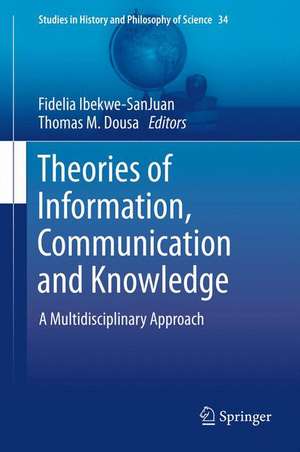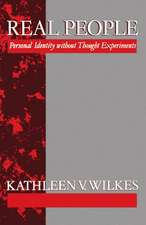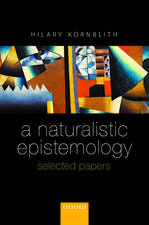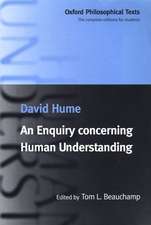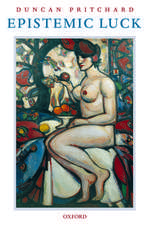Theories of Information, Communication and Knowledge: A Multidisciplinary Approach: Studies in History and Philosophy of Science, cartea 34
Editat de Fidelia Ibekwe-SanJuan, Thomas M Dousaen Limba Engleză Hardback – 13 sep 2013
While a lot has been written on the definition of these concepts, less research has attempted to establish explicit links between differing theoretical conceptions of these concepts and the underlying epistemological stances. This is what this volume attempts to do. It offers a multidisciplinary exploration of information and communication as perceived in different disciplines and how those perceptions affect theories of knowledge.
| Toate formatele și edițiile | Preț | Express |
|---|---|---|
| Paperback (1) | 564.21 lei 38-44 zile | |
| SPRINGER NETHERLANDS – 23 aug 2015 | 564.21 lei 38-44 zile | |
| Hardback (1) | 575.18 lei 38-44 zile | |
| SPRINGER NETHERLANDS – 13 sep 2013 | 575.18 lei 38-44 zile |
Din seria Studies in History and Philosophy of Science
- 15%
 Preț: 650.19 lei
Preț: 650.19 lei - 15%
 Preț: 700.75 lei
Preț: 700.75 lei -
 Preț: 284.47 lei
Preț: 284.47 lei - 15%
 Preț: 702.24 lei
Preț: 702.24 lei -
 Preț: 389.88 lei
Preț: 389.88 lei - 18%
 Preț: 1222.94 lei
Preț: 1222.94 lei - 15%
 Preț: 647.08 lei
Preț: 647.08 lei - 15%
 Preț: 645.47 lei
Preț: 645.47 lei - 18%
 Preț: 956.33 lei
Preț: 956.33 lei - 18%
 Preț: 953.97 lei
Preț: 953.97 lei - 15%
 Preț: 646.11 lei
Preț: 646.11 lei - 15%
 Preț: 641.85 lei
Preț: 641.85 lei - 15%
 Preț: 644.49 lei
Preț: 644.49 lei - 18%
 Preț: 951.29 lei
Preț: 951.29 lei - 15%
 Preț: 647.40 lei
Preț: 647.40 lei - 18%
 Preț: 953.20 lei
Preț: 953.20 lei - 18%
 Preț: 946.87 lei
Preț: 946.87 lei - 18%
 Preț: 1384.56 lei
Preț: 1384.56 lei - 18%
 Preț: 1234.14 lei
Preț: 1234.14 lei - 15%
 Preț: 637.78 lei
Preț: 637.78 lei - 15%
 Preț: 633.53 lei
Preț: 633.53 lei - 18%
 Preț: 1219.77 lei
Preț: 1219.77 lei - 24%
 Preț: 586.94 lei
Preț: 586.94 lei - 18%
 Preț: 967.56 lei
Preț: 967.56 lei - 15%
 Preț: 641.38 lei
Preț: 641.38 lei - 15%
 Preț: 642.68 lei
Preț: 642.68 lei - 15%
 Preț: 642.03 lei
Preț: 642.03 lei - 15%
 Preț: 641.85 lei
Preț: 641.85 lei
Preț: 575.18 lei
Preț vechi: 718.98 lei
-20% Nou
Puncte Express: 863
Preț estimativ în valută:
110.07€ • 114.22$ • 92.00£
110.07€ • 114.22$ • 92.00£
Carte tipărită la comandă
Livrare economică 13-19 martie
Preluare comenzi: 021 569.72.76
Specificații
ISBN-13: 9789400769724
ISBN-10: 9400769725
Pagini: 380
Ilustrații: VI, 331 p.
Dimensiuni: 155 x 235 x 28 mm
Greutate: 0.65 kg
Ediția:2014
Editura: SPRINGER NETHERLANDS
Colecția Springer
Seria Studies in History and Philosophy of Science
Locul publicării:Dordrecht, Netherlands
ISBN-10: 9400769725
Pagini: 380
Ilustrații: VI, 331 p.
Dimensiuni: 155 x 235 x 28 mm
Greutate: 0.65 kg
Ediția:2014
Editura: SPRINGER NETHERLANDS
Colecția Springer
Seria Studies in History and Philosophy of Science
Locul publicării:Dordrecht, Netherlands
Public țintă
ResearchCuprins
Introduction; Fidelia Ibekwe-SanJuan and Thomas Dousa.- Chapter 1: Cybersemiotics: A new foundation for transdisciplinary theory of information, cognition, meaning, communication and consciousness; Søren Brier.- Chapter 2: Epistemology and the Study of Social Information within the Perspective of a Unified Theory of Information;Wolfgang Hofkirchner.- Chapter 3: Perception and Testimony as Data Providers; Luciano Floridi.- Chapter 4: Human communication from the semiotic perspective; Winfried Nöth.-
Chapter 5: Mind the gap: transitions between concepts of information in varied domains; Lyn Robinson and David Bawden.- Chapter 6: Information and the disciplines: A conceptual meta-analysis; Jonathan Furner.- Chapter 7: Epistemological Challenges for Information Science; Ian Cornelius.- Chapter 8: The nature of information science and its core concepts; Birger Hjørland.-
Chapter 9: Sylvie Leleu-Merviel. Coalescence in the informational process. Application to visual sense-making. Chapter 10: Understanding users’ informational constructs through the affordances of cinematographic images; Michel Labour.- Chapter 11: Documentary Languages and the Demarcation of Information Units in Textual Information: A Case Study; Thomas Dousa.- Index.
Chapter 5: Mind the gap: transitions between concepts of information in varied domains; Lyn Robinson and David Bawden.- Chapter 6: Information and the disciplines: A conceptual meta-analysis; Jonathan Furner.- Chapter 7: Epistemological Challenges for Information Science; Ian Cornelius.- Chapter 8: The nature of information science and its core concepts; Birger Hjørland.-
Chapter 9: Sylvie Leleu-Merviel. Coalescence in the informational process. Application to visual sense-making. Chapter 10: Understanding users’ informational constructs through the affordances of cinematographic images; Michel Labour.- Chapter 11: Documentary Languages and the Demarcation of Information Units in Textual Information: A Case Study; Thomas Dousa.- Index.
Recenzii
From the book reviews:
“The standard of writing is generally very good and there is evidence that the editors have done a good job in ensuring a high quality of intellectual argument. … this is an excellent introduction to the rich and varied debates around the nature of information, revealing that the field is actually far from agreement. … There is also sufficient depth and breadth to make it a valuable resource for the more knowledgeable as well.” (John Mingers, Cybernetics and Human Knowing, Vol. 21 (3), 2014)
“The standard of writing is generally very good and there is evidence that the editors have done a good job in ensuring a high quality of intellectual argument. … this is an excellent introduction to the rich and varied debates around the nature of information, revealing that the field is actually far from agreement. … There is also sufficient depth and breadth to make it a valuable resource for the more knowledgeable as well.” (John Mingers, Cybernetics and Human Knowing, Vol. 21 (3), 2014)
Textul de pe ultima copertă
This book addresses some of the key questions that scientists have been asking themselves for centuries: what is knowledge? What is information? How do we know that we know something? How do we construct meaning from the perceptions of things? Although no consensus exists on a common definition of the concepts of information and communication, few can reject the hypothesis that information – whether perceived as « object » or as « process » - is a pre-condition for knowledge. Epistemology is the study of how we know things (anglophone meaning) or the study of how scientific knowledge is arrived at and validated (francophone conception). To adopt an epistemological stance is to commit oneself to render an account of what constitutes knowledge or in procedural terms, to render an account of when one can claim to know something. An epistemological theory imposes constraints on the interpretation of human cognitive interaction with the world. It goes without saying that different epistemological theories will have more or less restrictive criteria to distinguish what constitutes knowledge from what is not. If information is a pre-condition for knowledge acquisition, giving an account of how knowledge is acquired should impact our comprehension of information and communication as concepts.
While a lot has been written on the definition of these concepts, less research has attempted to establish explicit links between differing theoretical conceptions of these concepts and the underlying epistemological stances. This is what this volume attempts to do. It offers a multidisciplinary exploration of information and communication as perceived in different disciplines and how those perceptions affect theories of knowledge.
While a lot has been written on the definition of these concepts, less research has attempted to establish explicit links between differing theoretical conceptions of these concepts and the underlying epistemological stances. This is what this volume attempts to do. It offers a multidisciplinary exploration of information and communication as perceived in different disciplines and how those perceptions affect theories of knowledge.
Caracteristici
Addresses a multidisciplinary approach to theories of information and knowledge Discusses one of the most important topics for the development of the global knowledge society Provides contributions by renowned authors? Includes supplementary material: sn.pub/extras
